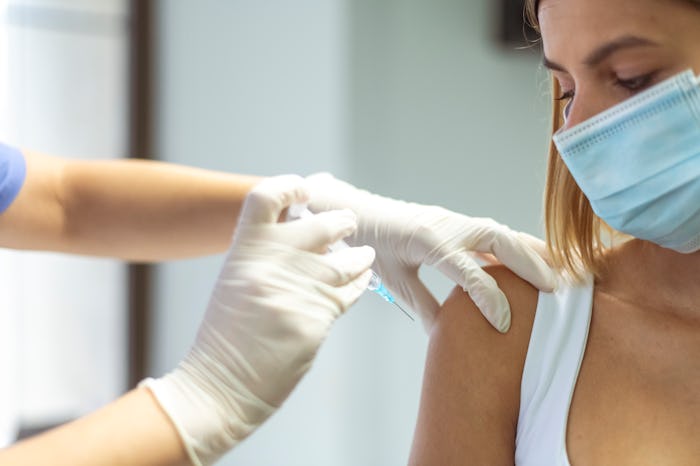Coronavirus

Everything We Know About Covid-19 Vaccine Boosters So Far
If you’ve already been vaccinated, there could be a booster shot in your future. New updates continue to shed more light.
Americans now have three options, green-lit by the U.S. Food & Drug Administration (FDA), to become vaccinated against Covid-19 (there’s Johnson & Johnson, Moderna, and Pfizer, the latter of which the FDA recently shared its full approval), and a vaccine for young children is now a reality.
Parents can consider vaccinations for children 5 and up, and the Centers For Disease Control and Prevention (CDC) encouraged all pregnant people to get vaccinated.
And now a Covid-19 booster is available for already-vaccinated individuals who received initial doses of the mRNA shots from Pfizer-BioNTech and Moderna. The FDA has now expanded the Emergency Use Authorizations for both to allow a booster shot to people over 18, as per a news release on the FDA’s website. But, as the release also says, the CDC’s Advisory Committee on Immunization Practices is also meeting and expected to relay more suggestions.
Do I Need A Covid-19 Booster Shot Or Not?
First understand, if you’ve been vaccinated, you have very good protection against serious sickness. But yes, it’s been reported that there is data suggesting that protection, or the effectiveness and duration of protections could start to decline months after some vaccinations; some experts, like National Institute of Allergy and Infectious Diseases director Anthony Fauci, have discussed potentially using boosters in an effort to keep protections high and more enduring. Some reports of booster use outside of the U.S. are showing promise.
Weeks ago, the CDC shared on its website a set of recommendations regarding Pfizer-BioNTech Covid-19 booster shots for certain higher-risk individuals and populations. Those already vaccinated individuals who received their first round of Pfizer shots and were over 65, and in long-term care environments, and/or are between 50 and 64 years old with underlying medical conditions had been recommended to receive a booster starting six months after their first full dosage. Those people who were between 18 and 49 years old with underlying medical issues, and those 18 to 64-year-olds who are more at risk due to their environments, either occupational or institutional, could also be eligible for a booster.
The FDA had also green-lit on its website the use of the Pfizer-BioNTech Covid-19 Vaccine booster shot for people at and over 65, and for people from 18 to 64 years old that are at increased risk, and/or are in environments, either institutional or occupational, of exposure that could lead to a high risk.
But with the omicron variant now officially making up most of the Covid-19 cases, experts are pushing for everyone who is at least six months out from their original vaccine dosages to get a booster. The FDA has also authorized kids ages 12 to 15 to get a booster if they are at least five months out from their original dose.
How Can I Get A Covid-19 Booster Shot If I’m Eligible?
Turn to your vaccine provider and ask about eligibility. As per The Department of Health and Human Services, providers that are enrolled in CDC Covid-19 Vaccination Program should make the Pfizer booster shots available to those in eligible groups. Another resource to consider is vaccines.gov, which allows you to select a vaccine, and type in your zip code to see providers near you.
Why Are Boosters Even Being Discussed?
Pfizer, one company behind a currently approved vaccine for individuals 12 years of age and older, shared on its website that in its studies of the Pfizer-BioNTech Covid-19 vaccine (BNT 162b2) in several hundred cases, it appeared effective for at least six months. And Pfizer updated on its website that the company shared with the U.S. FDA data which could support the potential use of a booster, eight to nine months following the second dose. The company had shared new of their ongoing research into the possibility of using boosters to potentially renew protections or potentially offer protections from variants. Moderna had shared that the company was also studying the possibility of boosters for those already vaccinated, and the effectiveness of its vaccine against threatening variants.
Where Do We Stand In The U.S. Right Now?
As the CDC reported, over 195 million people in the U.S. have been vaccinated. While there are breakthrough cases, the vaccines are proving to work. The bottom line? The boosters can help stop the spread of this virus, and they’re being made available to kids and adults. Caregivers are naturally weighing their options, but the evidence is showing that these vaccines may provide protection in a way that is safe.
To stay up-to-date on the latest findings, head to romper.com/coronavirus.
This article was originally published on